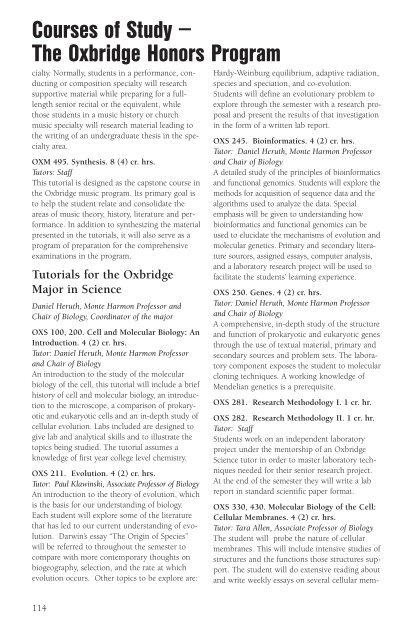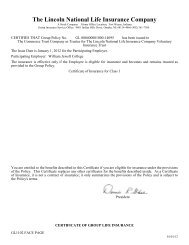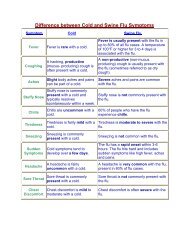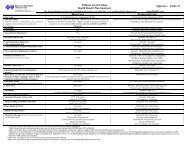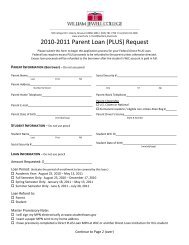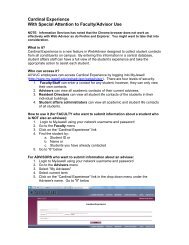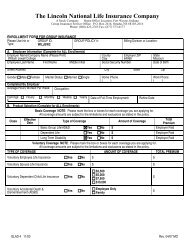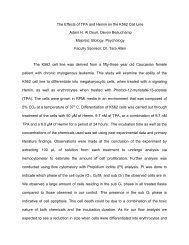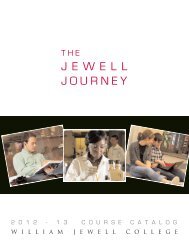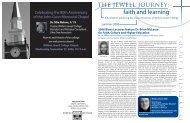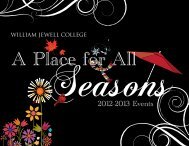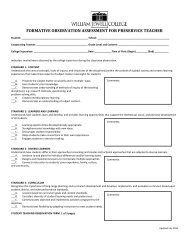Courses of Study - William Jewell College
Courses of Study - William Jewell College
Courses of Study - William Jewell College
Create successful ePaper yourself
Turn your PDF publications into a flip-book with our unique Google optimized e-Paper software.
<strong>Courses</strong> <strong>of</strong> <strong>Study</strong> –<br />
The Oxbridge Honors Program<br />
cialty. Normally, students in a performance, conducting<br />
or composition specialty will research<br />
supportive material while preparing for a fulllength<br />
senior recital or the equivalent, while<br />
those students in a music history or church<br />
music specialty will research material leading to<br />
the writing <strong>of</strong> an undergraduate thesis in the specialty<br />
area.<br />
OXM 495. Synthesis. 8 (4) cr. hrs.<br />
Tutors: Staff<br />
This tutorial is designed as the capstone course in<br />
the Oxbridge music program. Its primary goal is<br />
to help the student relate and consolidate the<br />
areas <strong>of</strong> music theory, history, literature and performance.<br />
In addition to synthesizing the material<br />
presented in the tutorials, it will also serve as a<br />
program <strong>of</strong> preparation for the comprehensive<br />
examinations in the program.<br />
Tutorials for the Oxbridge<br />
Major in Science<br />
Daniel Heruth, Monte Harmon Pr<strong>of</strong>essor and<br />
Chair <strong>of</strong> Biology, Coordinator <strong>of</strong> the major<br />
OXS 100, 200. Cell and Molecular Biology: An<br />
Introduction. 4 (2) cr. hrs.<br />
Tutor: Daniel Heruth, Monte Harmon Pr<strong>of</strong>essor<br />
and Chair <strong>of</strong> Biology<br />
An introduction to the study <strong>of</strong> the molecular<br />
biology <strong>of</strong> the cell, this tutorial will include a brief<br />
history <strong>of</strong> cell and molecular biology, an introduction<br />
to the microscope, a comparison <strong>of</strong> prokaryotic<br />
and eukaryotic cells and an in-depth study <strong>of</strong><br />
cellular evolution. Labs included are designed to<br />
give lab and analytical skills and to illustrate the<br />
topics being studied. The tutorial assumes a<br />
knowledge <strong>of</strong> first year college level chemistry.<br />
OXS 211. Evolution. 4 (2) cr. hrs.<br />
Tutor: Paul Klawinski, Associate Pr<strong>of</strong>essor <strong>of</strong> Biology<br />
An introduction to the theory <strong>of</strong> evolution, which<br />
is the basis for our understanding <strong>of</strong> biology.<br />
Each student will explore some <strong>of</strong> the literature<br />
that has led to our current understanding <strong>of</strong> evolution.<br />
Darwin’s essay “The Origin <strong>of</strong> Species”<br />
will be referred to throughout the semester to<br />
compare with more contemporary thoughts on<br />
biogeography, selection, and the rate at which<br />
evolution occurs. Other topics to be explore are:<br />
Hardy-Weinburg equilibrium, adaptive radiation,<br />
species and speciation, and co-evolution.<br />
Students will define an evolutionary problem to<br />
explore through the semester with a research proposal<br />
and present the results <strong>of</strong> that investigation<br />
in the form <strong>of</strong> a written lab report.<br />
OXS 245. Bioinformatics. 4 (2) cr. hrs.<br />
Tutor: Daniel Heruth, Monte Harmon Pr<strong>of</strong>essor<br />
and Chair <strong>of</strong> Biology<br />
A detailed study <strong>of</strong> the principles <strong>of</strong> bioinformatics<br />
and functional genomics. Students will explore the<br />
methods for acquisition <strong>of</strong> sequence data and the<br />
algorithms used to analyze the data. Special<br />
emphasis will be given to understanding how<br />
bioinformatics and functional genomics can be<br />
used to elucidate the mechanisms <strong>of</strong> evolution and<br />
molecular genetics. Primary and secondary literature<br />
sources, assigned essays, computer analysis,<br />
and a laboratory research project will be used to<br />
facilitate the students’ learning experience.<br />
OXS 250. Genes. 4 (2) cr. hrs.<br />
Tutor: Daniel Heruth, Monte Harmon Pr<strong>of</strong>essor<br />
and Chair <strong>of</strong> Biology<br />
A comprehensive, in-depth study <strong>of</strong> the structure<br />
and function <strong>of</strong> prokaryotic and eukaryotic genes<br />
through the use <strong>of</strong> textual material, primary and<br />
secondary sources and problem sets. The laboratory<br />
component exposes the student to molecular<br />
cloning techniques. A working knowledge <strong>of</strong><br />
Mendelian genetics is a prerequisite.<br />
OXS 281. Research Methodology I. 1 cr. hr.<br />
OXS 282. Research Methodology II. 1 cr. hr.<br />
Tutor: Staff<br />
Students work on an independent laboratory<br />
project under the mentorship <strong>of</strong> an Oxbridge<br />
Science tutor in order to master laboratory techniques<br />
needed for their senior research project.<br />
At the end <strong>of</strong> the semester they will write a lab<br />
report in standard scientific paper format.<br />
OXS 330, 430. Molecular Biology <strong>of</strong> the Cell:<br />
Cellular Membranes. 4 (2) cr. hrs.<br />
Tutor: Tara Allen, Associate Pr<strong>of</strong>essor <strong>of</strong> Biology<br />
The student will probe the nature <strong>of</strong> cellular<br />
membranes. This will include intensive studies <strong>of</strong><br />
structures and the functions those structures support.<br />
The student will do extensive reading about<br />
and write weekly essays on several cellular mem-<br />
114


